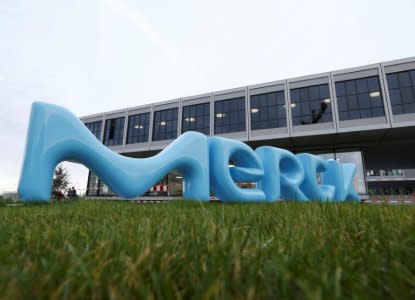Germany's Merck seeks partners for cancer and immune system drugs

Thomson Reuters
By Ludwig Burger and Patricia Weiss
FRANKFURT (Reuters) - Merck KGaA will seek development partners for experimental treatments including tepotinib as the German company looks to licensing deals to help fund clinical trials, according to its head of drug R&D.
Merck has a promising drug pipeline for the first time in several years. It is looking to take a collaborative approach, as an expected decline in operating profit this year forces it to find new ways to finance pharmaceutical development.
Luciano Rossetti, its drug research and development chief, told Reuters the company was engaged in "very intense ongoing conversations" over deals to help fund trials of drugs in its pipeline.
He said Merck was looking to strike agreements for treatments including oral lung cancer drug tepotinib as well as a so-called bifunctional fusion protein at an earlier stage of development, which aims to assist the immune system in fighting cancer cells.
Merck did not disclose the names of potential partners.
Rossetti said the company was preparing to present initial Phase 2 trial data for tepotinib at the American Society of Clinical Oncology (ASCO) in Chicago in June which he expected would show the drug blocks a genetic mutation that drives tumor growth in certain lung cancer cases.
"What we expect from this high-precision approach is to have a high response rate in this patient population," said Rossetti, adding that ASCO had the final word over whether the findings could be presented at the conference.
Bernstein analysts said in a March 21 note that tepotinib was the "one to watch" among Merck's early and mid-stage pipeline drugs, and predicted 2030 sales of 530 million euros ($650 million).
Licence partnership agreements, which typically see a drugmaker share the cost of trials with another pharma or biotech firm in return for a share of future sales, offer Merck a way to drive through a promising drug pipeline in as many disease types as possible.
However such deals are double-edged; while they curb risk, they also curb earnings.
Merck, a diversified company that also has chemicals and lab equipment divisions, does not have the financial firepower in pharmaceuticals of the sector's biggest players, including Roche, Pfizer, Novartis and Sanofi. This could prevent it challenging larger rivals in acquiring assets in a consolidating global market, analysts say.
Pharma majors often buy certain rights to experimental drugs from rivals or smaller biotech firms to bolster their pipeline. Selling rights, so-called outlicensing, is also common but is mainly driven by a desire to win partners in unfamiliar markets rather than financial constraints.
Merck's bifunctional fusion protein, which combines its approved cancer drug Bavencio's immunotherapy mechanism with a second immune trigger, is in Phase 1 trials. Drugs typically go through three phases of testing before a market launch, but in cancer can be cut short to two when regulators see sufficient promise.
LIQUID CRYSTALS
Merck, which started out 350 years ago as an apothecary shop in the German city of Darmstadt, sells products ranging from pearlescent pigments to dimmable window panes.
Healthcare - pharmaceuticals, allergy treatments and consumer health - accounted for 46 percent of its 15.3 billion euros of sales last year. Merck struck a deal this week to sell the consumer health unit to Procter & Gamble Co for 3.4 billion euros, but the company said this would not affect its plans to seek partners to help develop its pharma pipeline.
The group is in a bind; just as it turned around its drug pipeline with promising candidates against arthritis and cancer, its finances have been squeezed by Chinese competition for its biggest cash generator - liquid crystals for TV screens.
This means it is lacking the money to take the drug candidates forward under its own steam. Its shares have fallen 21 percent over the past year, compared with an 8 percent decline in the European pharma index and a 3 percent gain in the European chemicals index.
"Considering that Merck had next to no pipeline five years ago, they've built up something quite solid," said Markus Manns, portfolio manager at Union Investment, which holds shares in the German company.
"As an investor I wouldn't want to take an earnings hit if Merck were to decide to go it alone in pharmaceuticals development."
He added many pharma and biotech players were eager to grab a slice of other companies' promising new treatments, putting Merck in a "very comfortable position".
Merck, when it flagged its collaborative approach to drug development last month, had highlighted evobrutinib, a so-called BTK inhibitor designed to block white blood cells from launching an immune response at healthy cells. It is in the second phase of testing.
The drug's potentially broad use in the fast-growing autoimmune market, including rheumatoid arthritis, multiple sclerosis and lupus, would attract prospective partners such as Abbvie and Roche, said Manns.
Bernstein has identified Merck's stock as a bargain due to low market expectations. "Merck KGaA's pipeline is often overlooked by investors, rightly so given the lack of visibility and poor track record," said analyst Wimal Kapadia. "Given most investors expect failure, the risk/reward is to the upside."
($1 = 0.8112 euros)
(Editing by Pravin Char)
See Also:

 Yahoo News
Yahoo News 
